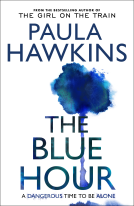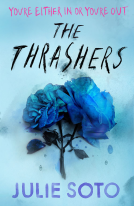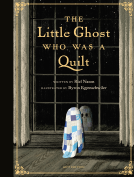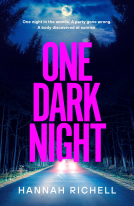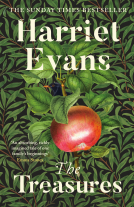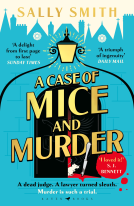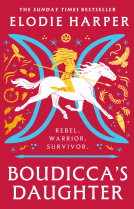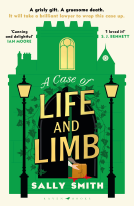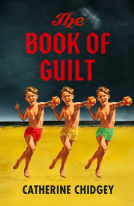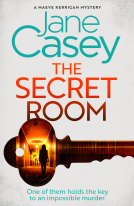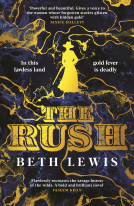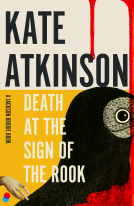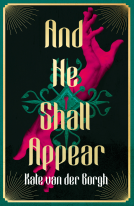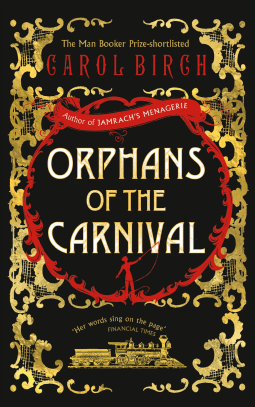
Orphans of the Carnival
by Carol Birch
This title was previously available on NetGalley and is now archived.
Send NetGalley books directly to your Kindle or Kindle app
1
To read on a Kindle or Kindle app, please add kindle@netgalley.com as an approved email address to receive files in your Amazon account. Click here for step-by-step instructions.
2
Also find your Kindle email address within your Amazon account, and enter it here.
Pub Date 1 Sep 2016 | Archive Date 1 Sep 2016
Description
A life in the spotlight will keep anyone hidden
Julia Pastrana is the singing and dancing marvel from Mexico, heralded on tours across nineteenth-century Europe as much for her talent as for her rather unusual appearance. Yet few can see past the thick hair that covers her: she is both the fascinating toast of a Governor's ball and the shunned, revolting, unnatural beast, to be hidden from children and pregnant women.
But what is her wonderful and terrible link to Rose, collector of lost treasures in an attic room in modern-day south London? In this haunting tale of identity, love and independence, these two lives will connect in unforgettable ways.
Advance Praise
‘Orphans of the Carnival is a rich and wonderful book. Carol Birch can see a world in a grain of sand - and then furnish it for you, vividly and unforgettably.’ M.R. CAREY, author of The Girl With All the Gifts
‘In this dazzling novel Carol Birch paints an extraordinary portrait of an extraordinary woman. Orphans of the Carnival encourages us to wonder what is revealed by the way a society treats those people who are unusual, who look different or who have their own unique view of the world.’ CATHERINE CHANTER, author of The Well
'An imaginative tour-de-force encompassing the sights and smells of 19th-century London and the wild sea . . . Gripping, superbly written and a delight - The Times
Riveting. Birch is masterful at evoking period and place . . . A teeming exhibition of the beautiful and the bizarre - Sunday Times
One of the best stories I've ever read . . . A completely original book - A. S. Byatt
Available Editions
| EDITION | Hardcover |
| ISBN | 9781782116547 |
| PRICE | £14.99 (GBP) |
Links
Featured Reviews
I think everyone who reads this book should go into it knowing that it’s a novel with its feet firmly based on facts. I did, and it gave me a huge empathy with the main character Julia Pastrana, a woman who really existed, the notorious ape woman of Mexico who toured the world with Victorian freak shows. Just Google her name and you’ll find the original playbills for the carnivals she starred in and her photograph which haunted me throughout the book.
Oh my Gosh, did people really ostracise and revere “freaks” of nature, people with deformities and disabilities to such an extent that they became the celebrities of the day? Pointed at, poked and prodded and oohed and ahhed over, screamed and shrieked at for their horrifying appearance and all the time making a living the only way available to them by making a public display of their otherness, their difference? Yes, you better believe it, they did!
Julia was born in a small mountain village, brought up by friends and relatives after the mother she barely remembers, dies and leaves her orphaned and alone. Bad enough to live in poverty and be orphaned but Julia is an oddity, an ugly ape like countenance, covered almost entirely in fur or hair, with an extended jaw. But she is also a lively child, quick to learn, she is an accomplished dressmaker and eager to please others, she masters the art of languages, singing and dancing to keep people entertained.
A teenager she dances at a local wedding when she is spotted by a showman who offers her the chance of escape and soon she veils her face (the only way she can go out in public without creating a furore) and sets off by train to join a carnival troupe.
The people she meets, fellow freaks and monsters accept her for what she is, there are the armless and legless girls, a rubber man, an enormously fat lady and not least, Cato a pinhead, with a tiny egg shaped skull, a huge wide grin, little bent legs that make him always remain childlike, an irrepressible boundless energy and the inability to speak but to constantly vocalise his feelings in loud shrieks. Between little Cato and Julia grows a firm bond, and she mothers him to the extent that she feels a deep affection for him like a sibling or the son she longs for.
She soon becomes well known and is approached by Theo, an enterprising and ambitious young man who nevertheless proves to be feckless and impulsive. She allows herself to be coerced by him into allowing him to manage her and he takes her off on a whirlwind tour of first the US, then Europe, Russia and worldwide.
This book follows her life, as in the spotlight as a life can possibly be yet she can never walk alone outdoors for fear of exposure and ridicule and the one time she sets off to have a little adventure ends dreadfully in discovery and disaster. The medical profession long to examine her origins but are unable to concur why or how she is quite so very different to the norm.
All Julia wants is a normal family life, loving friends who aren’t using her and she daren’t even voice the thought that she longs for a loving relationship with a man., as she knows this is as unlikely as the hope that one day she will wake up and have a smooth fair skin with no coarse hair covering it.
I followed her life and relationships in this book as intimately as if I was there, I felt hurt on her behalf when she is used and abused by others, It is brutal, honest and frank, I found parts disturbing and some of the practises, so distasteful I balked.
Meanwhile there is a modern thread running alongside Julia’s story. We are introduced to Rose in the 1980’s she is a modern woman and seemingly completely unconnected to Julia’s story in any way at all. Rose is a hoarder of junk, she is hard to warm to, she has an erratic lifestyle, various failed relationships and in her own way is as much of a misfit to society as Julia was. There seems no point to this thread, at times wondering why has the author included it? But that does become clear and provides a poignant and harrowing finale.
There is an island of broken dolls which Rose dreams of visiting and amongst her hoarded junk is a broken and ugly damaged doll she rescues from a skip. She calls it Tattoo and won’t be parted from it. When I discovered the secret of Tattoo, it broke my heart and I urge anyone reading it to remember that this is also based around fact.
Crikey, parts of this book did upset me, I cried bucketloads and am shedding a tear now as I write my review. I have used terms which are anathema to me, freak and monster, as they are used in the book as they were used to Julia’s face in real life, but don’t think this comes easy to me – it really doesn’t because what Julia is, is NOT a monster but a charming, astute and lonely young woman crying out to be loved and I just wanted to give her a big hug and tell her the one thing that nobody ever seemed capable of doing during her life “You’re not a monster, you’re lovely”
I have read a few books by Carol Birch, The wonderful Jamrach’s menagerie, the compelling Scapegallows and more. She has the knack of searching out the unusual, embroidering it with her own unique style, embellishing fact by turning it into fiction and peopling it with larger than life rumbustious characters so you are sucked into a world which is far removed from everyday life yet ethereally authentic and satisfying.
Orphans of the Carnival is a wonderful atmospheric read portraying what it’s like to be truly different and chronicling a life spent making the best of what you’ve got.
 dereena w, Media/Journalist
dereena w, Media/Journalist
To be the marvel of the Governor's Ball one day , to be shunned as a hideous beast the next. Julia has to deal with this and everything in-between. She can sing and dance like the best of them, speak several languages but Julia has one big difference. She is covered in thick hair. Will she ever know what love is, or independence? Perhaps Rose, a pursuer of lost treasures has the answers? A touching, and at times, moving story, Carol Birch captures life in a freak show and what we'd give to be 'normal'.
 Kate D, Media/Journalist
Kate D, Media/Journalist
To be published in numerous magazines in October: Twenty one year old Julia is a sensation on the 19th century carnival stage. She’s a talented dancer and singer, but the reason people flock to see her is because she’s covered from head to foot in thick, dark hair. Travelling the country with one freak show after another, Julia finds fame, but all she really wants is love and acceptance. In modern day London, Rose may not look particularly dissimilar to anyone else, but she sees the world in a different way. A poignant tale of how society so often struggles to accept those who stand out.
 Beverley C, Educator
Beverley C, Educator
A intriguing read and one which I mostly enjoyed. The tragic story of Julia, a freak, exploited and ultimately used by her opportunist husband, is well told but at times too drawn out, sometimes started to lose me. Also the modern day thread was quite unnecessary - I was tempted to skip them as they just became an annoyance and they in no way added to the impact of the plot I felt. Overall a particularly haunting, emotive book - well worth a read.
 Emma W, Reviewer
Emma W, Reviewer
I requested this book based on its beautiful cover and the fact that it’s about carnivals – I can’t resist a carnival/circus story. But this book is so much much more than a throwaway, fun-filled tale set under the big top.
Orphans Of The Carnival is based on the true story of Julia Pastrama, a woman born in 19th Century Mexico. With her face and body covered in thick black hair and an unusually wide nose, her looks were almost more reminiscent of an ape than of a woman. Being born into a time when so little was understood about medical oddities such as hers, Julia was singled out and ostracised from a young age. To try to build a future for herself despite her unusual appearance, she left her home of Mexico in her late teens to move to America and embarked on a tour with a circus tribe.
Julia isn’t someone who gets by on her unusual appearance alone; she’s intelligent, articulate and an accomplished singer and dancer, and she shocks and mesmerises all who cross her path. It isn’t long until she’s snapped up by Theo Lent, a regular on the circuit who believes he can take her career to the next level.
And he does – soon Julia is a world-renowned performer, touring the globe, attending prestigious events and performing countless solo shows. This story isn’t all glitz and glamour though, the author explores what might have been going on underneath the surface. Julia was a vulnerable young woman who wanted people to see past her exterior and appreciate her for her many other talents, and for a while she believes she may have found that person in Theo. Theo was appalled and fascinated by Julia in equal measure, but above all he recognised her as unique – a money-making machine, not to be let go of.
This book isn’t packed with action and drama, it’s more of a slow burner. I have to admit I found it a little slow-moving at times, but it’s worth bearing in mind that the main events of the story are all heavily based in fact.
Following Julia’s journey to fame we also see the darker side, as the author offers small vignettes which explore the unfair treatment she received. From taunting teenagers to probing doctors and her own husband’s secret taint of disgust, Julia struggles to find peace in her life and, when her life is tragically cut short, it doesn’t stop there. I don’t want to give too much away but it was the events which took place after Julia’s death which truly shocked me.
Whilst this story didn’t have me gripped to the pages, I’m still glad I read it. Carol Birch has given Julia Pastrama a voice and breathed life into a woman who was tragically misunderstood after all these years. Her story is tragic, haunting and disturbing. An insightful look at the exploitative nature of the traditional circus, and a homage to a unique woman – this book is well worth a read.
 Sandra D, Reviewer
Sandra D, Reviewer
What to say about this unusual novel by Carol Birch? First, I loved part of it. Second, I didn’t realize until I got to the end that it is loosely-based on a true story. If you loved Birch’s ‘Jamrach’s Menagerie’, try this.
1854. A young veiled woman travels by train from Mexico to New Orleans. She is disfigured but we don’t know the exact details until quite a way into the book: this is a novel which rewards patient reading. Julia Pastrana becomes a music hall attraction - singing, dancing, playing a guitar - while undergoing examinations by doctors who proclaim her part-human. Her successive managers make the most of the doctors’ pronouncements. This is a linear narrative, Julia’s life story, driven by her search for unconditional love.
The real Julia Pastrana had large ears and nose, irregular teeth and straight black hair all over her body. Despite her obvious intelligence – she spoke three languages - the myths continued until her death. It is an indictment of the way people not considered ‘normal’ were treated in the 19th century, seeing them as attractions rather than people with feelings.
The modern-day storyline of Rose, a young woman who collects unwanted items, was, for me, an unnecessary distraction from the main story. The obvious connection between the two women is their struggle to fit into society, though Rose is more of an emotional drifter.
Read more of my book reviews at http://www.sandradanby.com/book-reviews-a-z/
Orphans of the Carnival is a strangely moving novel, based on the life of Julia Pastrana, a woman who was born in 1834 Mexico. What makes Julia so noteworthy in the Victorian era? She was a thoroughly unique individual who spoke three languages, sang and danced beautifully and was billed as a 'bear woman' in a carnival act, being covered in hair and having facial features not unlike an ape. This novelized story of her life explores her remarkable story.
First off, the subject matter for this novel was well chosen. Julia may have been described as the ugliest woman in the world but she had the soul of an angel. In this book she is loving, tender and kind in a way that drew people to her and earned her devoted, life-long friends. It's hard to imagine that a woman born with such a rare genetic condition could conquer the world as she did but she used her looks to her advantage and made the most of her situation.
Orphans of the Carnival is beautifully written so as to bring Julia and her talent to life. I feel as if I know her and Theo very well and though my feelings on what transpired are mixed, I believe Julia enjoyed a rich life filled with wonder and amazing opportunities. I'm sad the book has ended. I have enjoyed having Julia's sweet spirit in my life. What a gifted individual she must have been.
 Gem L T, Reviewer
Gem L T, Reviewer
Julia Pastrana sometimes even wonders herself if she is actually human. She speaks, thinks, sings and dances like a human, but the thick hair all over her body and the posters and news stories that proclaim her to be a ‘bear-woman’ or hybrid Orang-Utang take their toll.
Her unusual looks combined with a pleasant singing voice and a talant for dance do provide a career in the circuses and theatre’s of America. Soon she is the toast of the elite, but can her heart ever find similar adoration and acceptance?
The story mainly focuses on Julia and her parts are told in close third person from her point of view. As such we develop tremendous empathy for ‘The Ugliest Woman In The World’ as we hear her thoughts, fears, triumphs and hopes throughout.
However hers is not the only voice herad, later in the book when we meet the manager that will make her famous, his perspective is often shown too and the tale as a whole is shot through with small vignettes from the life of a modern young woman called Rose. Quite the opposite of Julia – much desired but little travelled preffering to surround herself with lost treasures in her attic room in South London. Her stuff means more to her than her relationships with those around her.
This was an easy read, it’s skillfully written and although many of the characters are ‘freaks’ or ‘curiosities’ we get to see their humanity over and above anything else. In fact it wasn’t too long before I started hoping that Julia Pastrana had been a real person and decided to Google her – just not till I got to the end of the book as I didn’t want to spoil it!
The descriptions of the carnival, theatre’s and locations are terrific but they don’t take centre-stage at any time, they are always the perfect backdrop to the human action taking place.
Oddly the most bizarre character in this story is the one who appears physically to be the most ‘normal’ – a nice twist and one that drives home the point that it’s what’s on the inside that counts!
4 Bites
NB I received a free copy of this book through NetGalley in return for an honest review. The BookEaters always write honest reviews
 Lora M, Reviewer
Lora M, Reviewer
This turned out to be a fascinating story, though it started out a little poetic and vague. It took a chapter or two to really get into what was going on, but once the background of the main character, Julia, started coming out, I definitely wanted to keep reading.
Julia was born 'different'. She has hair all over her face and body like fur, and the face itself appears ape-like. After her mother abandons her as a small child, she is taken care of in comfortable circumstances until the old woman who looks after her dies, then Julia sets out on her own and eventually joins a carnival freak show.
The variety of characters in the freak show provides some interesting personality quirks that come of growing up 'different'. Julia sometime bristles at the casual way in which the other 'freaks' refer to her anomaly, though her sensitivity goes largely unnoticed.
Julia is like many young women and wants the same things, like nice dresses, but she is aware of the effects of her appearance and is told she will never 'get a man'. She's also very talented and can sing and dance, which takes her beyond just being a freak into being a valued performer.
It wasn't until the end of the story that I learned that Julia was a real person, though the events of her life are fictionalized in the story. Wikipedia has an interesting entry about her. The story is well told and gives the reader some insight into what it must be like to grow up and live as someone who is visibly different and the treatment she gets as a result. Very poignant.
 David P, Reviewer
David P, Reviewer
Orphans of The Carnival is the follow up to Carol Birch's acclaimed and shortlisted Jamnach's Menagerie. It is based on the real life story of Julia Pastrana, a Mexican woman who toured the carnivals, theatre's and circuses singing and dancing. What made her such a draw was her bearded and almost primate like appearance, something which has now been diagnosed as Gingival Hyperplasia. The books starts with her travelling from her native Mexico to New Orleans to join what could only be termed a freak show. Her life on the road and around America, Europe and further afield is the scaffolding for the story here. Although the people are real and the story follows what happened, the supporting characters are Birch's own. There is also a modern day (well late seventies) story interwoven into this
There is something that draws you in to this and much like the victorians its almost with a sense of wonder and revulsion you read the unfolding events. The central character is one that is all too human and pulls on the emotions. Birch makes the whole thing tick along extremely well and when you finish the book it does linger and leave you thinking. The interwoven modern story doesn't work as well. It has a nice finish and perhaps almost redeems itself, but honestly I don't believe the book would have been any worse without that element.
Dark, often very emotive and always full of heart this book is one that will make you feel for our heroine and in the end feel slightly revolted by others and the whole scenario.
I received this in exchange for an honest review from NetGalley. Thank you the author, Carol Birch, and the publisher, Canongate Books, for this opportunity.
First of all, can I just address how beautiful this cover is! That, alongside the intriguing title, immediately engaged my shallow attention. The allusion to this being a story along the vein of The Night Circus also had me hooked! I would say the latter is a weak connection, as the only real similarity is the carnival/circus setting that takes place in both.
This is the fictional account of the life of Julia Pastrana. Born with a rare defect that is better summarized in her Wikipedia page, than I could begin describe it:
<i>she was born with a genetic condition, hypertrichosis terminalis (or generalized hypertrichosis lanuginosa); her face and body were covered with straight black hair. Her ears and nose were unusually large, and her teeth were irregular. The latter condition was caused by a rare disease, undiagnosed in her lifetime, Gingival hyperplasia, which thickened her lips and gums.</i>
Her different appearance made her the source of horror and ridicule during her entire life and led to her becoming a world-renowned 'circus freak'. Please note that I use this term with disgust and empathy.
This book narrates her from adolescence up until her death in a raw and honest portrayal of her character, society and the time period.
This is a difficult read. Her treatment, and the judgement cast upon her character just because of her outward appearance, saddened and appalled me and it made this a difficult read. It was, also, an important one, chronicling the darkness of societal opinion and judgement, that used Pastrana as the figurehead of unveiling the reader's awareness of the horrific treatment of anyone termed 'other' in the nineteenth century.
What saddened me the most, whilst reading this, was how simple Pastrana's wishes for happiness where. Her self-deprecation meant she accepted her treatment, and never blamed others for their hatred or was angered by it. She utilized what she was born with and her only wish was to earn enough money to buy a small house in the countryside and life happily and peacefully.
In the novel, there are small segments from the present day that seemed almost surplus and disunifed with the rest of the story. The link is explained, however, in a shocking grand reveal towards the close of the novel. Despite this, I thought the contemporary characters were surplus and a few chapters were wasted on their character, when only a small part of their story needed to be told to create the link.
Whilst difficult, this novel relays an important story that should not be lost to time. Julia Pastrana continues to have a voice in these words and I encourage everyone to hear her sing.
 Arwen W, Reviewer
Arwen W, Reviewer
A life in the spotlight will keep anyone hidden
Julia Pastrana is the singing and dancing marvel from Mexico, heralded on tours across nineteenth-century Europe as much for her talent as for her rather unusual appearance. Yet few can see past the thick hair that covers her: she is both the fascinating toast of a Governor's ball and the shunned, revolting, unnatural beast, to be hidden from children and pregnant women.
But what is her wonderful and terrible link to Rose, collector of lost treasures in an attic room in modern-day south London? In this haunting tale of identity, love and independence, these two lives will connect in unforgettable ways.
I was given an ARC by Netgalley in exchange for a fair and honest review...
I was surprised to realise that Julia was a real person. I did some research on the story after I finished the book.
The book hilights the abuse and exploitation that Miss Pastrana endured and it's heartbreaking to read that human beings can do this to one another. Julia was seduced by the words of a man who told her she would make so much money by travelling to America and allowing him to manage her career.
In reality, her money was mainly sucked up by the various people who ran her life. Had it not been for the advice of some women she performed with, Julia would never have asked for a contract.
She had several "managers", before she married Theo Lent. He claimed he married her for love but I think it's fairly sure that he married her to protect his investment and his bank balance. Yet another abuser in a long line. It was never about Julia. It was all about what she could bring to other people.
Even though the main body of the book is fictional, the basic facts are the same. I thank the author for making me aware of Julia Pastrana's incredible story.
A five out of five star read.
I am profoundly grateful to Netgalley and Canongate Books for my copy.
 Polly K, Reviewer
Polly K, Reviewer
Not realizing that this book was based on a true person, I read it as a novel. Julia Pastrana, born covered in hair and with the appearance of an ape, entered show business as a freak. Displayed this way, people did not see her as a real person, only a freak. Traveling throughout America and later Europe and Russia allowed her to see how others lived, making her yearn for a "normal" life. It seemed to me that most of the people she met only wanted to take advantage of her, including her future husband. The only drawback with this book seems to be the monotonous tone of the writing, dragging on and on.
 Carolyn S, Reviewer
Carolyn S, Reviewer
About a third of the way into this book, I realised it was based on a true story. And what an incredible story it is! Suddenly this novel warped form being a tale about a circus freak to one about a real woman and that totally changed my relationship with the characters.
Julia Pastrana was born with hair all over her face and body, a large thrusting jaw and a double set of teeth. Born in Mexico in the 19th century, she was protected by her family and lived in the Governor's household where she was educated and learnt to sing, play the guitar and dance. Spotted by a carnival owner one day she takes up his offer to join his menagerie of circus freaks and sing and dance her way around the world. Julia wants only to be loved and respected for herself and eventually after being sold to many different managers, ends up with a husband/manager who tours her around the theatres of Europe.
This is a very sad story, made more so be knowing the events described really occurred even though this is a fictionalised account. What happened to Julia after her death is truly horrific and unbelievable. A second story thread set in current times about a woman who collects old, broken things that people throw away, is interwoven through Julia's story and appears totally unrelated until you make the horrendous connection near the end of the book.
This is definitely an interesting book to read. It will take you out of your comfort zone as you realise that even though we no longer parade unusual looking people as circus freaks these days, we are still learning to accept people for who they are and not be biased about how they look.
 Olga N, Reviewer
Olga N, Reviewer
Thanks to NetGalley and to Canongate book for providing me with a copy of this novel in exchange for an honest review.
Although I’ve never been to a circus I’ve always been interested in stories, books, films and artworks about the circus. And I’ve never forgotten the movie Freaks (1932) directed by Tod Browning, that is as beautiful and touching as it is horrifying (not because of the ‘freaks’ of the story, but because of the way they were exhibited and exploited) , since I first saw it many years back. Human beings have always been fascinated by the unknown and by those who are similar but different to us (not only from a different country and race, but sometimes truly different, something that Freud tried to explain when he defined the ‘uncanny’ as something that is familiar and strange at once and can cause attraction and repulsion at the same time.
This is the first novel by Carol Birch that I read, and although I was interested in her literary career, what made me pick it up was the subject matter. The author writes about Julia Pastrana, a woman born in Mexico in 1834 with two severe genetic malformations that resulted in her body being covered in hair and in her having a protruding mouth and lips with two rows of teeth. There circulated strange stories about her origin (still available nowadays), and she was spotted in a Mexican house by somebody in showbiz and ended up in the circus and carnival circuits, first in the US and then throughout most of Europe. The novel tells her re-imagined story, although, as the writer explains at the end, she used the basic known facts of her life as scaffolding that allowed her to fill in the gaps and create a fictionalised account of her short but intense life.
Julia’s story is interspersed in the novel with some chapters about Rose, a woman of our time (or thereabouts) who lives in a small apartment in London and who is could be defined as a hoarder. But more than a hoarder, she seems to feel an affinity for the objects she finds, no matter how broken and tatty, as if their stories called to her and she feels she has to rescue them and give them a home. When she finds a strange and half-destroyed doll at the beginning of the novel we don’t know yet what the link with Julia is. We don’t find that out until the very end (or close enough, although I missed one of the clues, so intent I was on following Julia’s story at that point) and it’s sad but somehow it offers a sense of closure. The mention of the island of the Dolls that also exist in reality adds another layer of strangeness and creepiness (or enchantment, it depends on one’s point of view) to the story.
The book is written in the third person from the various main characters’ points of view. The historical account is mostly from Julia’s point of view (and giving her a voice, after so many years of being the object of the gaze is a great decision), although later when she meets Lent the points of view alternate between the two and I feel that the author makes a good job of trying to get into the mind of her husband, a man difficult to empathise with or understand, especially from a modern point of view (although I’m sure people at the time wouldn’t have been comfortable with his behaviour either, at least the most enlightened ones). Rose’s chapters, although far less numerous, are told from her point of view and later from Adams’s, a neighbour, friend and lover. The novel is beautifully written; it does not only manage to create a sense of place and of the historical period, but it also succeeds at building up a psychologically consistent portrayal of both Julia and her husband. I felt there was far less detail about the contemporary parts of the story and although I did appreciate the eventual confluence of plots (so to speak, but I’ll avoid giving away any spoilers), I’m not sure that the two parts fit perfectly well, enhance each other rather than distract from one another, or that we get to know or understand the contemporary characters other than superficially. To be fair to the author, I can’t imagine many fictional stories that could compete with Julia’s real life (and afterlife).
This is a book where those who are deemed less than human run rings around the self-professed echelons of society, and I’m sure I’ll keep thinking about this story that touches on colonialism, misogyny, exploitation, issues of race, disability, diversity… Yes, I felt compelled to check the story of Julia Pastrana and other than some discrepancy about the date of her marriage, the novel is accurate regarding the facts, proving the adage that reality is stranger than fiction. And history for sure.
This is a book that will interest people who enjoy Victoriana and historical fiction of the era, and anybody who likes to read a well-written novel with great characters. It is a sad story (and I cried more than once) but it deserves to be told and read. Perhaps we don’t have carnivals or shows of the style described in the book any longer, but we shouldn’t be complacent because we are not as enlightened as we might like to think. A fascinating novel about a fascinating human being and the society of her time.
 Media/Journalist 220505
Media/Journalist 220505
“When you think about it- every person’s like a museum of their life.” and none more so than Julia whose museum tag would surely have read 'Hairy Freak', covered as she is with fur.
Julia Pastrana was mistaken for a werewolf and although could speak three languages, strangers assume that she is mute. Born with hypertrichosis, an abnormal amount of hair grows on the body, two rows of teeth and bigger mouth led to her being seen as a monster in the mid 19th century and her only option was to monetise this and join circus life. As her fame grows she experiences the tension between her musical talent and her physical appearance which constantly detracts from the former.. Her new manager became her husband and they both went on to travel throughout Europe but life and love as a 'normal' woman stands tantalisingly out of reach. .
Julia was a real person but this is a fictionalised account of her life alongside a smaller, parallel story set in 1980s London and featuring a woman, Rosa, attracted to common, ordinary objects in place of an attraction to people. This is a mistake and these sparsely written chapters seemed clumsily inserted into a narrative which stood up in its own right. I had no interest in Rosa who seemed a cut-out of a character compared to the vulnerable, brave and vibrant Julia who was not afraid to show us what she yearned for.
 Cathy B, Educator
Cathy B, Educator
Really three and a half stars. Even though I enjoyed finding out more about what it must have been like for Julia to be "different", especially since the character really existed, I found the first part of the book much more interesting than the second one. The second story line was not really necessary in my opinion. It just distracted from the main story. It's a good book, maybe I just read it at the wrong time.
 elizabeth m, Reviewer
elizabeth m, Reviewer
Orphans of the Carnival, by Carol Birch
The premise behind Carol Birch's novel is a fascinating one, for she tells the story of a travelling "freak" who toured America and Europe during the 19th century, performing by singing, dancing and playing on the guitar to audiences at all sorts of venues, from spit and sawdust circus tents and sideshows, to the homes of the wealthy European aristocracy. Julia Pastrana describes herself as "the ugliest woman in Europe"- a woman of sensibility and intellect who also happens to look like an ape. In the hands of an Angela Carter, whose character, Fevvers, in Nights at the Circus was truly memorable, I suspect that this novel, too, would have been quite stunning, for Julia Pastrana and her experiences provide a wealth of potentially fascinating elements. Unfortunately, Carol Birch hasn't fully developed the character of Julia, so that, while the reader can, to a certain extent, empathise with her frustration at the limitations her physical appearance put on her ability to fulfil her considerable potential, we never really get a sufficiently in depth look at what is, undoubtedly, a highly complex human being; nor do we get a really close focus put on her relationships with the other characters whom she encounters, particularly the man she marries and with whom she has a son. It is such a pity, in my view, that the breathless pace of the novel never permits any detailed examination of the motivations and behaviour of any of the multitude of interesting characters whom we encounter in the course of the novel. The parallel plot, set in the present time,doesn't really illuminate the Julia Pastrana story- in fact, I found myself becoming irritated when the author took us away from what I felt were the central characters to concentrate on other, much less intriguing people and their concerns. All in all, I would say I was rather disappointed by this novel which, although readable, failed to live up to its initial promise .
 Alison D, Reviewer
Alison D, Reviewer
This new novel from Carol Birch intrigued me from the start. The premise of a circus and human freaks in Victorian times sounded like a winning formula in my eyes. That and the fact that I thought her previous novel Jamrach's Menagerie was fantastic and compelling, though a bit gruesome. Jamrach's is, for me, a memorable story.
When I started reading about Julia Pastrana I didn't realise that she had actually existed which, in hindsight, may have been a blessing. From the outset the writing style was fluid and engaging. The author's prose is lyrically descriptive, evoking striking images of time and place. I had a real sense of Julia, not so much from the initially sparse physical descriptions, but from her feelings as she experiences her new found freedom, acceptance by the other 'freaks' and her growing confidence. The fact that this confidence proves fragile when she has some hostile encounters make her an empathetic character.
When Rose was introduced I became confused. Just what do these sparsely written interspersed chapters set in 1983 have to do with Julia's story? A skip raider and collector of broken toys?
Two managers later and Julia is now travelling with Theo Lake and that was the point at which I became uneasy. As their story unfolded it was for me uncomfortable reading. I had this feeling that I had to read on but I didn't really want to.
I now appreciate that this whole storyline is based on fact but it didn't make this book any less uncomfortable. I don't think that the Rose story added anything, in fact I felt it detracted from the flow of the book. Personally I would have been more interested in reading about Cato, Myrtle and Delia.
